CONFEDERATE CIVIL WAR LETTER FOUND IN PAXTON FAMILY BOOK ROCKBRIDGE VIRGINIA
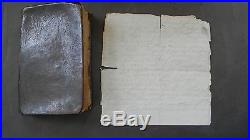
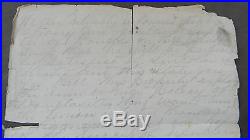
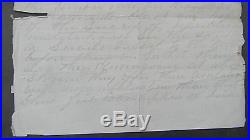
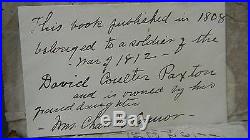
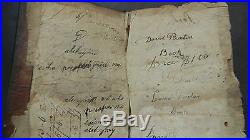
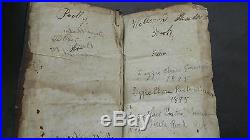
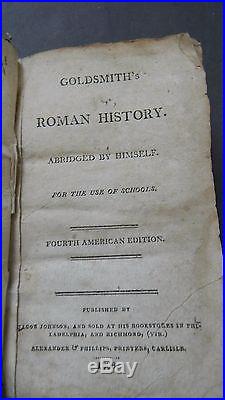
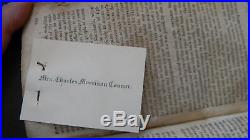
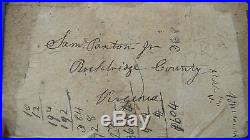
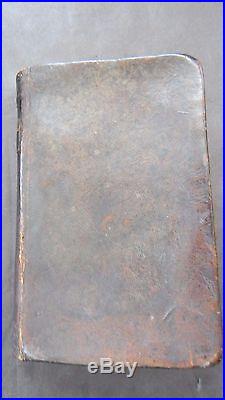

I recently discovered this antique leather-bound copy of GOLDSMITH'S ROMAN HISTORY in an old New England barn. Inside the book was an antique envelope with this information written on it. This book published in 1808 belonged to a soldier of the War of 1812 David Coulter Paxton and is owned by his granddaughter Mrs. In addition to the envelope was a calling card pinned to a page that belonged to Mrs. " On the front inside blank endpage is written "David Paxton Book.
David Paxton also signed the back side of the page twice. On the back inside cover is written Sam Paxton Jr. Apparently the Paxton family settled in Rockbridge County, Virginia in the mid 18th century. Paxton was a famous Civil War Confederate General that fought and died in the Civil War he was also from Rockbridge County, Virginia. Also found inside the envelope inside the book was a small letter written in pencil on blue paper.
The letter is not signed or dated but appears to have been written just before the Civil War by someone involved in politics. The letter mentions both Lincoln and Douglas the two presidential candidates. We are reliably informed that a strange and Zealous response of Douglas in this ------ says that he will be perfectly satisfied if Lincoln is elected and this state goes for Bill.
This properly explains the "----- or rule" policy of the Douglasites. They would burst the union into ten thousand fragments.Blast every hope of the success of Republican institutions -- see the South a Servile Vassal to the North rather than see the demagog at whose shrine they offer their adulation with more infatuation than the blind fire worshipers of Asia. This interesting letter measures approx.
7 1/2 x 7 1/2 inches. There are some chips along the edges and some tears on the folds. I have repaired one of the tears with invisible archival tape otherwise the letter is in good condition! The binding of the leatherbound book is slightly sprung otherwise good condition! From Wikipedia, the free encyclopedia.March 4, 1828 Rockbridge County, Virginia. May 3, 1863 (aged 35) Chancellorsville, Virginia.
Initially buried at Guinea Station, Virginia. Reburied at Stonewall Jackson Memorial Cemetery. Elisha Franklin Paxton (March 4, 1828 May 3, 1863) was an American. Lawyer and soldier who served as a general. In the Confederate States Army.
During the American Civil War. He died in combat leading the famed Stonewall Brigade.
During the Battle of Chancellorsville. Paxton was born in Rockbridge County, Virginia. He was the son of Elisha Paxton and Margaret McNutt, a Presbyterian.Family, and his grandfather was American Revolutionary War. His first education came from his cousin James H.
In 1845 he attended Washington College. And in 1847 he entered Yale University. Located in New Haven, Connecticut. Paxton then attended the University of Virginia Law School.
Graduating at the top of his class. When fully grown Paxton was described as "five feet ten inches high, heavily built and of great bodily strength". A physique that inspired his childhood nickname, "Bull". He was known not to drink alcohol.
Upon graduating Paxton settled in Virginia. And became a lawyer, then a bank president in Lexington. He also later worked as a planter, and then moved to Ohio. After passing the state's bar examination. He worked for several years in Ohio prosecuting land claims.His law practice ended in 1860 because of his failing eyesight, but this did not stop him from becoming prominent in political matters. His son Matthew wrote that he was a man of ardent temperament and strong convictions such as did not permit him to remain an indifferent spectator of the exciting political occurrences of era. " His "blunt and outspoken views on behalf of the secession.
Caused a rift in his friendship with Lexington resident Thomas J. The two men did not speak to each other until after each had joined the Confederate Army. When he was 26, Paxton married 23-year-old Elizabeth Hannah White (died February 16, 1872).She was the daughter of Matthew White and lived in Lexington. They would have four children together, three of whom out-lived Paxton: Matthew W. Is a direct descendant of Elisha Paxton (great-great-grandson) and his son John Gallatin Paxton. Matthew became the editor of the newspaper Rockbridge County News and John a lawyer in Kansas City, Missouri.
Frank lived in San Saba County, Texas. At the start of the American Civil War in 1861, Paxton chose to follow his home state and the Confederate cause. Despite a lack of any military training, Paxton entered the Confederate Army on April 18 as a first lieutenant. Of the Rockbridge Rifles, part of Col. First Bull Run, actions 2 p.
The 4th Virginia fought on July 21 during the First Battle of Bull Run. Jackson's First Brigade of the Army of the Shenandoah.
Soon to be known as the Stonewall Brigade. Paxton was wounded in an arm during this battle.
And his actions won him praise from his comrades. After recovering, Paxton was elected. Of the 27th Virginia Infantry. On October 14, 1861, but was not re-elected to the position the following spring. Because of his "heavy-handedness and a lack of tact". On May 30, 1862, Paxton was appointed aide-de-camp. To Jackson's staff, and participated in the Valley Campaign. And the Seven Days Battles. By August 4, 1862, Paxton was made Jackson's assistant quartermaster. And fought in the Northern Virginia Campaign. Paxton was appointed assistant adjutant general. On Jackson's staff on August 15, and took part in the Second Battle of Bull Run. On August 2830, and then in the Maryland Campaign. And the Battle of Antietam.Took over the Stonewall Brigade. William Baylor was killed at Second Bull Run. At Antietam, the loss of Brig. Left Grigsby in charge of an entire division, two command levels above his rank.
Despite this, Jackson refused to give him permanent command of anything above regimental level. On November 1, 1862, Paxton was promoted from major to brigadier general.
And assigned command of the Stonewall Brigade. It was a move that did not sit well with the men he passed over, officers with more experience as well as seniority. Paxton was the choice of Jackson and the posting was made directly by Confederate President. Although Jackson rarely deviated from protocol for promotions, his justification for selecting Paxton was that none of the subordinate commanders in the Stonewall Brigade was the "best qualified" for the position because I did not regard any of them as competent as another.Paxton assumed command of the brigade on November 15. Grigsby was "as mad as thunder" and resigned his commission in protest. During the Battle of Fredericksburg. On December 13, Paxton and his brigade in the division of Brig. Were on the right of the Confederate defense when Union Maj.
S division made a brief (and unsupported) successful attack, but Paxton's men counterattacked and drove the Federals off. Fredericksburg campaign historian Frank O'Reilly criticized Paxton's performance during the engagement, judging that.
[Paxton] mismanaged the brigade, caused needless casualties by halting under cannon fire, and missed an opportunity to surround and capture two Union regiments. Paxton, because of his inexperience, made numerous mistakes but none so disappointing as misjudging his opponent. Paxton wasted important time trying to wheel his brigade into position without first pinning the enemy in place. Consequently, Paxton's Stonewall Brigade barely collided with the Northerners before the Pennsylvanians escape from the trap. By the spring of 1863, Bull Paxton, who a member of his staff described as a "rather profane and godless man" found new solace in religion, possibly because of his association with the religious Stonewall Jackson.He started carrying a pocket Bible and on the night before the Battle of Chancellorsville. He admitted a premonition of his death and prepared himself for it.
On the second day of battle, the brigade was part of Jackson's audacious flanking movement around Union Maj. Paxton and his brigade were stationed to guard Germanna Junction on May 2, and that night his men were ordered to the front line. After Jackson was wounded, command of the Second Corps. But when he too was hit, cavalry commander Maj.
On May 3 Paxton led his men through densely wooded terrain towards the Union position. He was on foot at the head of his brigade when he was shot through his chest.
Killing him within an hour. Randolph Barton of Paxton's staff wrote that Paxton fell only two feet away from him.
I placed my arm under him, when he muttered,'Tie up my arm', and died. He was not shot in the arm, but through the heart. Later that day army commander Gen. Sent a wire to the authorities in the Confederate capitol of Richmond. The enemy was dislodged from all his positions around Chancellorsville and driven back towards the Rappahannock, over which he is now retreating. We have to thank Almighty God for a great victory. I regret to state that Gen'l Paxton was killed, Gen'l Jackson severely and Gen'l [Heth] and D. Paxton was initially buried at Guinea Station, Virginia, a short distance from where Jackson lay dying. He was later brought back to Lexington and was re-buried there in the Stonewall Jackson Memorial Cemetery.Within a few feet of his former commander. The item "CONFEDERATE CIVIL WAR LETTER FOUND IN PAXTON FAMILY BOOK ROCKBRIDGE VIRGINIA" is in sale since Tuesday, April 26, 2016. This item is in the category "Collectibles\Militaria\Civil War (1861-65)\Original Period Items\Correspondence, Mail".
The seller is "armoryantiques" and is located in Providence, Rhode Island. This item can be shipped worldwide.
